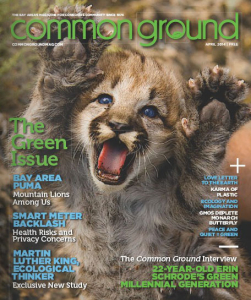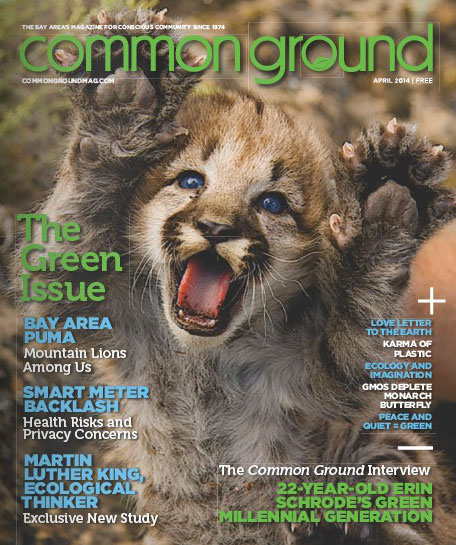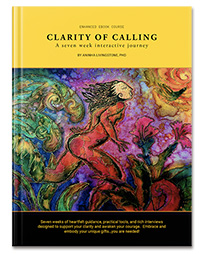Ecology and Imagination
Awakening the Visionary
By Aninha Esperanza Livingstone, Ph.D.
Common Ground April 2014
Visionaries have always relied on the imagination as a source of inspiration and guidance. In these times of ecological crisis, logic remains the dominant mode of thinking. Imagination has become an underused resource. Reengaging this truncated capacity could catapult us out of the dread of probability and into the spaciousness of possibility.
 One of those visionaries was Albert Einstein who claimed, “We can’t solve problems by using the same kind of thinking we used when we created them.” The ecological problems that we currently face arose from thinking such as:
One of those visionaries was Albert Einstein who claimed, “We can’t solve problems by using the same kind of thinking we used when we created them.” The ecological problems that we currently face arose from thinking such as:
Humans are the apex of evolution.
We are the only species that is truly conscious.
Competition is the natural order.
We are separate and independent.
The instinctual and earthly is lower, sinful, dangerous, and to be dispelled and conquered.
If this kind of thinking cannot lead us out of the mess we have gotten ourselves into, what kind of thinking will? Einstein might tell us that we need to give more credence to our imagination, based on his proclamation, “Imagination is more important than knowledge, for knowledge is limited to all we now know and understand, while imagination embraces the entire world, and all there ever will be to know and understand.”
To imagine is to leave behind the conventional, the rational, the known, and the expected. It is a leap.
Imagine this:
You are a cell in the body of the earth and you have a specific cellular function that when carried out helps maintain the health of the planet.
The earth is self-healing and you are part of that process.
Everything is alive and in conversation.
The waters, plants, animals, and ancestors are all allies in planetary healing.
Your life exists for something larger than you can know with your linear mind.
Imagination is a doorway into possibility. It is also a doorway into another mode of perception. By opening to imagination we can activate the capacity to perceive a realm of subtlety that seems to have all but disappeared from our consciousness. Like the parting of the mists of Avalon, we become privy to a world that has been there all along, but has been cloaked by a thick fog.
Henry Corbin, a visionary born in France in 1903, called this the “imaginal realm” which he differentiated from fantasy. Here, an extended reality is perceptible through intuitive channels.
Just as we have five senses that register the physical world, we also have subtle senses that we have been taught to mistrust, deny, minimize, override, and ignore. But these channels are what allow us to respond like cells in the body of the earth.
Without them, we cannot hear the speech of the earth as our own. Without them we cannot participate in any conversation other than human to human. Without them, we remain prisoners to linear thinking which does not constitute our full humanness, and therefore our full ability to face the challenges of our time.
Our full humanness can be retrieved through remembrance and reclamation that we are vaster and more connected than we have been led to believe. Whereas we have biological sight, so too do we have an inner eye that receives images, and sees subtle realms. Whereas we have physical hearing, so too do we can we listen to the whispers of soul and nature. Whereas we have tactile sensation, so too do we have an intuitive body that registers the unseen. And lastly, we are made to be more than a repository of knowledge, we also have knowing beyond explanation.
How do we recover our mother tongue, the language than existed before words? We become trackers of nature and soul. We revalue the subtle. We remember the unseen. We learn to trust the fleeting and ephemeral. Like lizards whose tails have been severed, we regrow our true form.
It is less a matter of learning to access this subtle realm, and more a matter of paying attention to what is already occurring. The more we listen, the more we grow to trust the wisdom of these earth bodies.
As with any language, immersion supports fluency. Our mother tongue arose within the matrix of evolution, the natural world. It lives within us fully formed. When we spend time in nature, it awakens. When we allow ourselves to become childlike and curious, daring to speak to those who communicate without words, it awakens. When we imagine that it is possible, no matter where we may be, meeting a stranger on a city street or alone in an old redwood grove, it awakens.
A good place to start is to keep a journal and track which channels are active. The most common are inner eye, inner ear, inner knower, and kinesthetic. Here are a few questions to help you discover what comes most naturally to you:
Do images arise in your mind’s eye, accompanied by a feeling of importance? If so, your guidance might come primarily through the visual channel. Do you hear inner whispers that have a different quality than the chatter of your mind? Perhaps you are more tuned to the auditory. If you have “gut feelings” that act as your compass, you are likely to be kinesthetically inclined. Lastly, if your inner knower channel is strong, you may find yourself knowing things without apparent reason.
We are being called to listen more deeply, to respond more fully, and to know ourselves as the earth herself. What is needed today, is not a few brilliant visionaries to lead the way, but a high cell count of visionaries who bring imagination into form. By planting this seed in modern soil, eroded though it may be, we participate in the intelligence of the earth and cosmos as they move through us.
Aninha Esperanza Livingstone, Ph.D. is a visionary who supports people to align with their calling. She specializes in non-linear approaches to following one’s unique purpose, offering both group and individual work. www.aninhalivingstone.com

